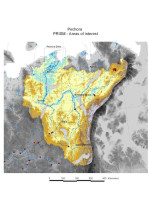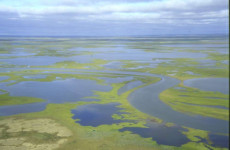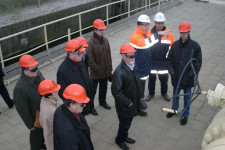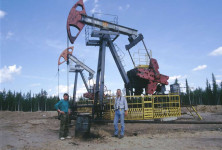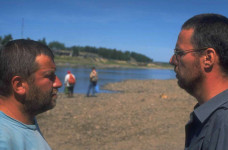International Scientific Cooperation
Pechora River basin Integrated System Management (PRISM)
BRIEF PREHISTORY OF PROJECT
 The Pechora River (Northeast European Russia) is one of the very few large European rivers that still are almost untouched by human influences. Only one bridge crosses the river's 1800 km main stream, and river training works are completely absent. Practically all 12 European salmonids species still occur in this river. The delta and its adjacent uplands and coastal plain are important breeding areas and stop-over sites for migratory birds, wintering in Western Europe and Africa. Besides large coniferous wood reserves, the extensive taiga landscapes in the river basin include considerable areas of old-growth forests, peat bogs and mountain ecosystems. It is expected that in the near future industrial activities related to the use of the rich oil, gas, mineral and forest resources will increase significantly. To safeguard the unique environmental quality in the entire Pechora river basin and the Barents Sea region, integrated water management is crucial. As the natural resources authorities in the Komi Republic and the Nenets Autonomous Region have the intention to develop policies in this field, so they are strongly in need of adequate policy instruments based on the integrated knowledge on the hydrological interactions between the terrestrial, wetland and aquatic ecosystems and the specific impact of human activities on these.
The Pechora River (Northeast European Russia) is one of the very few large European rivers that still are almost untouched by human influences. Only one bridge crosses the river's 1800 km main stream, and river training works are completely absent. Practically all 12 European salmonids species still occur in this river. The delta and its adjacent uplands and coastal plain are important breeding areas and stop-over sites for migratory birds, wintering in Western Europe and Africa. Besides large coniferous wood reserves, the extensive taiga landscapes in the river basin include considerable areas of old-growth forests, peat bogs and mountain ecosystems. It is expected that in the near future industrial activities related to the use of the rich oil, gas, mineral and forest resources will increase significantly. To safeguard the unique environmental quality in the entire Pechora river basin and the Barents Sea region, integrated water management is crucial. As the natural resources authorities in the Komi Republic and the Nenets Autonomous Region have the intention to develop policies in this field, so they are strongly in need of adequate policy instruments based on the integrated knowledge on the hydrological interactions between the terrestrial, wetland and aquatic ecosystems and the specific impact of human activities on these.
PROJECT LOGO & MAP OF THE PROJECT TERRITORY
DATES OF IMPLEMENTATION OF PROJECT
phase 1: 2003-2004
phase 2: 2005-2007
FUNDING ORGANIZATIONS
(for the phase 1)
- Partners for Water Programme, the Netherlands Government
- RIZA Institute for Inland Water Management & Waste Water Treatment (the Netherlands)
- Directorate-General for Public Works & Water Management (the Netherlands)
- Ministry of Transport, Public Works & Water Management (the Netherlands)
- Agricultural Section, Royal Netherlands Embassy in Moscow
- Netherlands Science Foundation
- Institute of Biology, Komi Science Centre, Ural Branch, Russian Academy of Sciences (Russia)
- Groningen University (the Netherlands)
PROJECT CO-ORDINATOR
Dr M.R. van Eerden, RWS RIZA, Lelystad, the Netherlands





